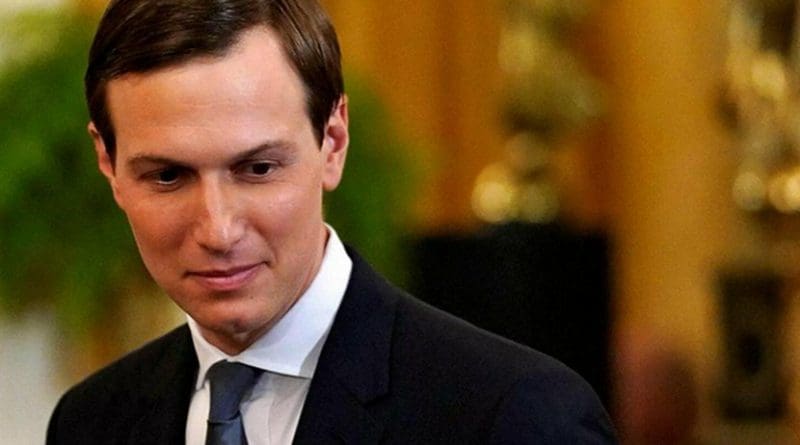Palestinian Leadership Has No Plan To End Israeli Oppression – OpEd
By Ray Hanania
I attended the “Peace to Prosperity” conference held in Bahrain last week and I found it fascinating. It inspired new thinking.
Jared Kushner, US President Donald Trump’s son-in-law and very pro-Israel special envoy to the Middle East, outlined his vision to provide $50 billion in economic support for the economically depressed Palestinians.
I have no doubts the Peace to Prosperity plan is intended to strengthen Israel’s apartheid control over stolen Palestinian lands and to undermine the political and statehood demands of the Palestinians. But that’s only if the Palestinians remain disengaged, as they always do.
Instead of just rejecting the ideas as the Palestinian “leadership” did — I put that in quote marks because I’m not sure who really is a leader among the Palestinians — they should have attended to assert a powerful response and, maybe, find a way to empower their cause for statehood.
Rejection isn’t a political strategy for Palestinians; it’s a self-defeating cultural trait that continues to grow. It’s easier to say “no” than to develop an effective counterstrategy to achieve your own goals. Failed leaders who can’t achieve their goals — but don’t want to embarrass themselves publicly by admitting it — say “no.”
Anyway, enough said about the failure of Palestinian rejectionism, the only strategy the Palestinians seem to have and can’t change.
What I saw went beyond that fatalism. It was a lot different than what Kushner and the failed Palestinian leadership want people to see. I saw the world’s most powerful business leaders talk about Palestinian needs and rights like they were important. Even Kushner’s plans were hard to brush aside, despite the biased, one-sided policies he has pursued so far regarding Jerusalem, the racist Jewish settlements, and settlement growth through land confiscation.
I listened to Kushner and, despite everything, I was impressed with what he said. Economic empowerment isn’t slavery. It takes you to the bank, not to the gulag. Kushner argued it was important to spell out an economic vision to Palestinians, Israelis and the world before unveiling the political strategy — to be done in the fall — “because we need people to feel like they could see what the future can look like.”
Kushner threw in the “gut-punch to reality” for me when he added: “My direct message to the Palestinian people is that, despite what those who have let you down in the past say, President Trump and America have not given up on you.”
The Peace to Prosperity conference brought in the world’s most powerful economic thinkers, and they were not all on Israel’s payroll. They included International Monetary Fund chief Christine Lagarde and Mohammed Alabbar, chairman of the UAE property and leisure group Emaar, which is driving the amazing economic growth I saw in Dubai days later. Emaar was the force behind the world’s tallest building, the Burj Khalifa in Dubai. At the conference, Alabbar said: “If there is a 1 percent chance we do something good here, we should get together and try.”
Financial leaders like Bahrain’s Osama Al-Absi, Shiv Khemka of India’s SUN Group, and Luis Alberto Moreno, president of the Inter-American Development Bank, laid out powerful visions on how Palestinians can be helped; not on how they can be undermined to achieve the Israeli government’s racist agenda. Palestinian critics attacked Moreno, asserting he mispronounced Rawabi, the Palestinian land development being built in the occupied West Bank by Palestinian billionaire Bashar Al-Masri.
The sadness for me was reinforced when news spread that the Palestinian government had begun arresting Palestinians who attended the conference, although they quickly stopped. A small delegation of Palestinian businessmen led by Ashraf Jabari, who chairs the Palestinian Business Network, was demonized by the Palestinian leadership as “working with the Israelis.”
Jabari was one of the least impressive presenters at the Bahrain conference. Visibly stressed and sweating, he fumbled through his panel talk. Criticize him, sure. But arrest him or his business colleagues? That’s ridiculous and shameful.
That kind of oppressive reaction is what has come to symbolize the future of the Palestinians for me: A tyranny of “leaders” who exploit the suffering of their people to keep them distracted from the truth of their own leadership’s failures, just so they can stay in power. The real elephant in the room at the Bahrain conference wasn’t an absence of discussion about the occupation, but rather the fact that the Palestinian “leadership” has absolutely no idea how to free the Palestinians from Israeli oppression.
Their vision of an independent Palestinian state has no blueprint or strategy. It is a failing the Palestinian leadership doesn’t want you to think about.
Tony Elumelu, chairman of the Nigeria-based Tony Elumelu Foundation, said it best during his panel discussion, when he spoke about how economic development can empower oppressed people. “People who have economic opportunity don’t go to extremes. It is the lack of economic opportunity that pushes people into extremism,” Elumelu said during the opening panel, titled “Unleashing Economic Potential.”

